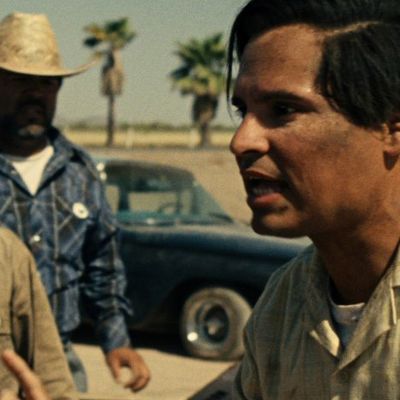
Cesar Chavez makes for a fine history lesson, but as drama, it leaves something to be desired. Starring Michael Pe├▒a, this portrait of the iconic Mexican-American labor leader has noble intentions, and you could do worse than show this film to a group of kids curious about ChavezÔÇÖs accomplishments. (An even better choice might be the excellent new documentary CesarÔÇÖs Last Fast, which focuses on ChavezÔÇÖs final act of resistance in 1988, a 36-day fast.) But the ultimate effect of this film, directed by actor Diego Luna, is curiously cold ÔÇö it never transcends the hagiographic nature of its material, despite a talented cast and a compelling subject.
Instead of telling ChavezÔÇÖs whole life, the film starts in 1962, when he founded the National Farm Workers Association. As a community organizer, Cesar (Michael Pe├▒a) is staggered to learn that the Hispanic farm workers he sees own nothing, canÔÇÖt read or write, and have to force their kids to work to scrounge together a living. So, determined to ÔÇ£get his hands dirty,ÔÇØ Cesar whisks his family ÔÇö his wife Helen (the excellent America Ferrara) and his eight kids┬áÔÇö from a comfortable suburban life and plops them in Delano, among the migrant laborers working the fields of CaliforniaÔÇÖs powerful growers. He wants to be close to the action, and to be breathing the same air as the people heÔÇÖs trying to help. The family isnÔÇÖt exactly pleased about this. ÔÇ£Which team plays for Delano?ÔÇØ asks his bitter teenage son Fernando when dad informs them theyÔÇÖre leaving for the middle of nowhere.
The early scenes of CesarÔÇÖs organizing have a stirring immediacy: LunaÔÇÖs camera focuses on hands, faces, feet, shoulders┬áÔÇö the corporeal building blocks of manual labor. But as these efforts become a movement, we enter the humdrum world of Biopic As Usual: Lyrical long shots of marching protesters, stoic confrontations with authorities, newsreel footage, and cut-aways to onedimensional, villainous business interests toasting Richard Nixon. (Though let it be said that co-producer John Malkovich gives it the old college try as a particularly hateful grower named Bogdanovich; no one does a casual sneer better than this man, and he enlivens the proceedings whenever heÔÇÖs onscreen.)
Pe├▒a is a fine actor, and he conveys CesarÔÇÖs drive with impressive steadiness, but the rest of the portrait never quite coheres. It feels too mythic, and we get very little sense of Cesar Chavez as a person. If we are to believe this movie, his only real failing was that he cared too much, that he was too devoted to his cause. That may well have been the case, and the last thing anyone wants is for a portrait larded up with soap-opera theatrics to give it ÔÇ£human interest.ÔÇØ But itÔÇÖs possible for a biopic to walk the fine line between myth and psychology: witness the self-doubt and even shame expressed in SpielbergÔÇÖs Lincoln, or the desperate need for self-actualization and acceptance portrayed in Spike LeeÔÇÖs Malcolm X.
Cesar Chavez does attempt some similar shading in its portrait of CesarÔÇÖs troubled relationship with his older son Fernando (Eli Vargas), who wants to live an ordinary life, resents getting picked on at school, and feels neglected by his father. But these exchanges come off as didactic, too; we donÔÇÖt walk away from these scenes with a sense of CesarÔÇÖs carelessness, but rather of FernandoÔÇÖs ignorance. ItÔÇÖs almost as if the film is afraid to suggest that Cesar Chavez might have been a human being, or that he might have ever been mistaken about anything. And how odd, even tragic, that thereÔÇÖs more human interest in the contemptible BogdanovichÔÇÖs exasperation with his own son ÔÇö a clueless scion whoÔÇÖs driving the family business into the ground┬áÔÇö than in CesarÔÇÖs interactions with his own family. Cesar Chavez may have its heart in the right place, but it should have taken ChavezÔÇÖs own advice to heart: It fails to get its hands dirty with the hard work of telling a story that feels like itÔÇÖs about real people.


